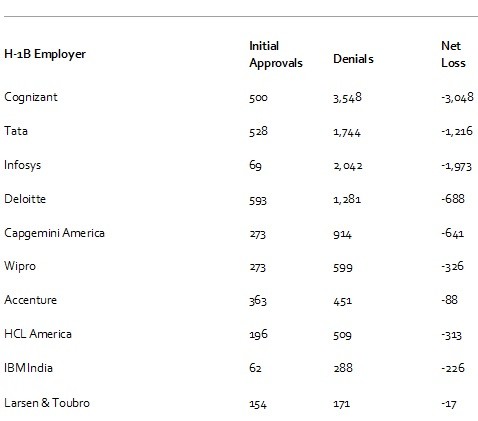It was obvious, panic and frustration had gripped my client. She blurted out, “they’re killing it, aren’t they?” She was referring to a memo that had just been issued by the USCIS, but it almost sounded like she was referring to the proverbial golden goose. The memo announced a change in policy, restoring and empowering USCIS adjudicators with the ability to deny petitions without having to first issue an RFE, or NOID. Although not specifically directed at the H-1B program, the memo allowed officers to issue what are called “statutory denials”. Apart from creating panic among clients, this memo had the chilling effect of discouraging, otherwise willing employers, from even attempting to hire well qualified students on an H-1B visa.
It is undeniable that the number of RFEs and denials has dramatically increased(.) However, based on 2018 H-1B usage, the biggest losers have been consulting companies.
See table below showing how H-1B approvals have decreased among consulting companies in 2018.
The RFEs and denials have little to do with the completeness, or quality of the petition, employer’s credentials, type of petition (change of employer, change of status, etc.), or for that matter, the nature, size and scope of the business. In fact, this sudden increase in RFEs and denials is entirely due to a “shift in the adjudication standard” for H-1Bs. This shift began with a memo rescinding prior guidance on “computer related occupations” and was further compounded by a memo, setting aside deference given to prior Service adjudications.
The President’s Executive Orders have become de facto rules and guidance, and USCIS officers have issued several contradictory decisions that have upended long established USCIS policy.
In keeping with this “shift”, the USCIS announced yet another memo updating the adjudication policy for H-1Bs involving third party client locations. As a result, the USCIS has increased specific requests for evidence targeting the “employer-employee relationship” and “right to control” an employee at the end-client site. In addition, this memo specifically directs adjudicating officers limit the period of H-1Bs to the itinerary/purchase order submitted with the petition.
Even when the initial petition contains overwhelming evidence of the employer-employee relationship and specific documentation pertaining to the job duties, the Service uses the RFE process to question the specialty occupation nature of the position!
Premium Processing. At the recently concluded annual conference of the American Immigration Lawyers Association, the hot topic among business immigration practitioners was the dramatic increase in the volume of H-1B RFEs. While discussing RFEs in general, the topic shifted to whether the likelihood of an RFE was increased when using premium processing. By show of hands, the answer was an overwhelming “yes”. This has been our experience as well. Avoiding premium processing may greatly increase the chances of approvability and provide the employer with the ability to obtain necessary corroborating documents (e.g., photographs, id badge, work emails, client communication, etc.) that may not otherwise be available when the petition is filed.
Responding to RFEs. It is in the best interest of the employer to respond to the targeted issues more deliberately and in a well-thought out manner. This sometimes requires patience on all sides. Trying to respond quickly, but without the required evidence may be counter productive.
Ultimately, responding to RFEs is a collaborative process and we encourage clients to discuss ways of providing the required evidence with their immigration team to ensure success.

